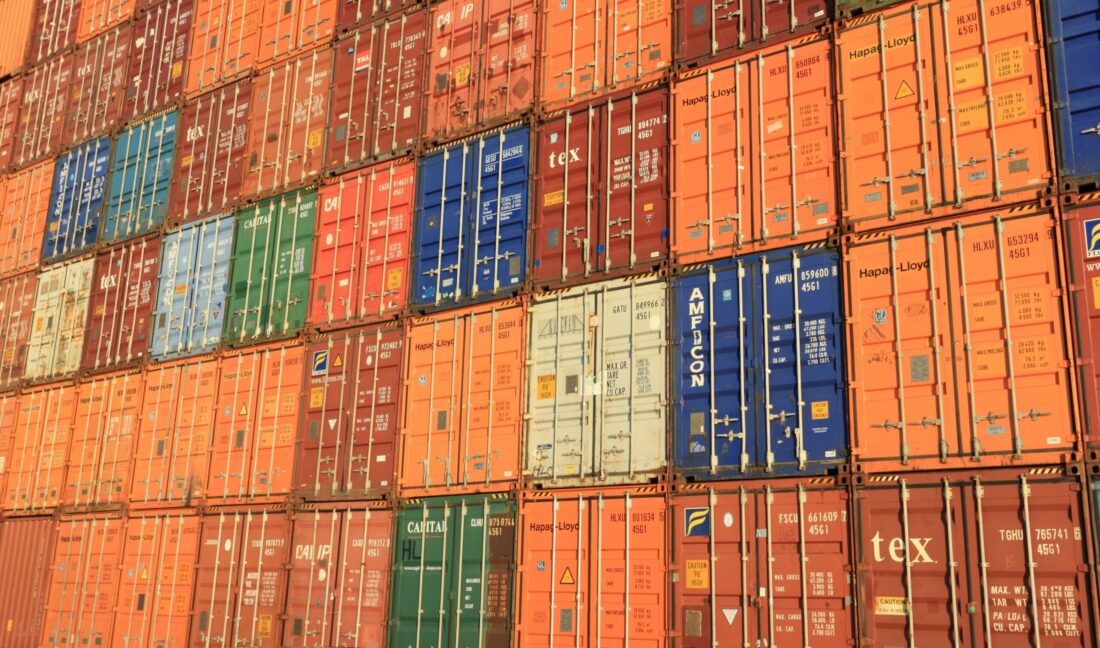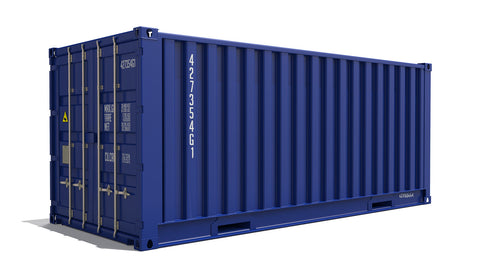10 creative business ideas using Shipping Containers
Wiki Article
Everything You Required to Understand About Shipping Containers and Their Practical Applications
Shipping containers have advanced from simple devices for transport to flexible structures with various useful applications. Their durable style and standard sizing make them excellent for a variety of uses beyond delivery. From ingenious housing remedies to sustainable farming, their flexibility is noteworthy. The possibilities do not end there. Discovering their various features exposes surprising insights into modern-day difficulties and imaginative remedies. What other roles could these containers play in today's globe?The Layout and Structure of Shipping Containers

Internally, containers are developed to maximize space, often including wood or steel floor covering that can sustain substantial weight. Ventilation systems might be included to prevent wetness buildup, which is crucial for delicate cargo. Furthermore, enhanced corners enable easy handling by forklifts and cranes, facilitating smooth loading and discharging. This thoughtful layout and framework add to the containers' adaptability across numerous delivery and storage applications.
Advantages of Utilizing Shipping Containers
While several transport approaches have their advantages, the usage of delivery containers stands out as a result of their unrivaled flexibility and performance. Shipping containers offer a standard size, making them very easy to stack and transfer throughout different modes of transportation, consisting of trains, ships, and vehicles. This standardization decreases loading and discharging times, thereby enhancing total efficiency.Shipping containers are created from durable materials, supplying durable security for goods throughout transportation. They are weather-resistant and safe, minimizing the risk of damages from ecological factors or burglary. In addition, the modular layout of shipping containers enables easy modification, making it possible for companies to adapt them for various objectives, such as storage or mobile offices.
Their transportability and cost-effectiveness make delivery containers an attractive alternative for organizations looking to enhance logistics and supply chain procedures. These advantages add to the growing popularity of shipping containers in different industries.
Creative Housing Solutions With Shipping Containers
Innovative housing solutions have become an exciting application of delivery containers, leveraging their integral toughness for residential use. These functional frameworks provide a sustainable choice to typical structure materials, often at a portion of the cost. Engineers and developers have transformed containers right into trendy, practical homes, catering to varied lifestyles and preferences.

Moreover, shipping containers are ecologically friendly, promoting recycling and lowering waste. Lots of tasks concentrate on power effectiveness, integrating solar panels and eco-friendly roof coverings. As urbanization rises, these cutting-edge housing remedies offer a practical feedback to real estate scarcities while promoting a special architectural aesthetic.
Shipping Containers in Retail and Pop-Up Shops
An expanding variety of sellers are turning to shipping containers as a vibrant solution for pop-up stores and retail areas. These versatile structures provide an economical choice to conventional shops, allowing organizations to create distinct, distinctive environments that bring in clients. Their modular design enables easy transport and setup, making them perfect for seasonal or short-term retail places.Retailers can personalize shipping containers to mirror their brand identification, changing them right into aesthetically appealing stores that attract attention in congested markets. The small nature of containers also motivates efficient use of area, enabling imaginative formats that enhance customer circulation and interaction. Additionally, shipping containers can be located in unusual locations, such as city parks or uninhabited lots, increasing availability and foot traffic.
As the retail landscape evolves, shipping containers supply a adaptable and innovative service that fulfills the demands of modern consumers while boosting the purchasing experience.
Sustainable Farming Practices Using Shipping Containers
Sustainable farming methods significantly incorporate Shipping Containers for Sale shipping containers as cutting-edge services for farming - Shipping Containers. These container ranches make use of hydroponics to maximize room and resource effectiveness, offering an economical approach to food manufacturing. By changing shipping containers right into farming hubs, farmers can deal with food security and environmental worries all at onceContainer Farming Advantages
While conventional agriculture encounters obstacles such as land scarcity and climate change, container farming offers a sensible option that takes full advantage of room and sources. This cutting-edge technique enables year-round crop production in regulated atmospheres, lowering dependence on weather. Container ranches make use of less water than standard farming, promoting sustainability and preservation. They can be developed in urban areas, bringing fresh produce closer to consumers and decreasing transport exhausts. Furthermore, the modular nature of shipping containers enables scalability, enabling farmers to adjust procedures based on demand. Container farming also reduces pesticide use by creating an enclosed ecological community, inevitably enhancing food safety. As city populaces expand, container farming becomes a useful option to fulfill the enhancing demand for regional, lasting food sources.Hydroponics in Containers
Hydroponics, which enables plants to expand without soil by utilizing nutrient-rich water, grows within the boundaries of shipping containers, making it an ideal method for city farming. These containers create a controlled setting that optimizes light, temperature level, and humidity, making it possible for year-round farming. With minimal area in metropolitan locations, shipping containers offer a scalable service for expanding fresh produce. Hydroponic systems within containers can include different methods, such as nutrient movie technique (NFT) and deep water culture (DWC), which optimize return while minimizing water use. This cutting-edge approach not just boosts food safety yet also lowers the carbon footprint connected with typical farming methods. Subsequently, hydroponics in containers stands for a forward-thinking service for lasting urban food production.Affordable Farming Solutions
As food manufacturing faces boosting difficulties due to environment change and urbanization, shipping containers become an economical service for farming. These functional structures can be repurposed for various lasting farming techniques, such as hydroponics and upright farming. By making use of regulated settings within containers, farmers can optimize development cycles and decrease resource intake, consisting of water and plant foods. In addition, shipping containers can be purposefully positioned in urban locations, decreasing transportation prices and improving access to fresh produce. Their modular nature permits scalability, making it possible for farmers to increase procedures as demand expands. Repurposing containers contributes to waste decrease, straightening with green agricultural initiatives. Generally, delivering containers present cutting-edge chances for reliable and lasting food production.Emergency and Catastrophe Relief Applications of Shipping Containers

Organizations frequently use shipping containers to create mobile centers or field hospitals, making certain that treatment gets to those in demand. Furthermore, they can be transformed right into command centers for coordinating rescue procedures, thus improving organizational efficiency throughout situations.
Furthermore, containers can be modified to store necessary items such as water, food, and garments, securing supplies until they are distributed. Their movement allows them to be conveniently moved to numerous locations, guaranteeing that help gets here where it is most urgently needed. Overall, shipping containers play a pivotal duty in boosting the efficiency of catastrophe alleviation efforts worldwide.
Frequently Asked Concerns
Just How Are Shipping Containers Transported From One Location to One More?
Shipping containers are delivered using ships, trucks, and trains, utilizing cranes for discharging and packing. This multi-modal transportation system guarantees efficient movement throughout land and sea, connecting global supply chains and promoting global trade.What Is the Average Lifespan of a Delivery Container?
The ordinary lifespan of a shipping container normally ranges from 10 to 25 years, depending on upkeep, use, and ecological factors. Appropriate treatment can prolong their functionality, while overlook may result in wear and tear and damages.Can Shipping Containers Be Customized for Various Usages?
Yes, shipping containers can be modified for different uses. They serve as homes, offices, pop-up stores, and storage space systems. Their adaptability permits innovative adjustments, making them appropriate for a vast array of applications.Are Shipping Containers Eco-friendly?
Shipping containers can be eco-friendly, as they promote repurposing and reusing. Their longevity decreases waste, while their use in alternative real estate and companies decreases the demand for brand-new products, adding to sustainable methods.Just how Do I Select the Right Dimension Shipping Container?
To pick the right size shipping container, one have to analyze storage space needs, think about the designated usage, and evaluate room schedule - Shipping Containers. Usual dimensions consist of 40-foot and 20-foot containers, each serving different storage space and transportation demands effectively
Innovative real estate services have actually emerged as an exciting application of delivery containers, leveraging their intrinsic strengths for residential use. The versatility of delivery containers enables for innovative formats, from single-unit houses to complicated multi-container setups. Lasting farming methods significantly integrate shipping containers as cutting-edge solutions for agriculture. In addition, the modular nature of delivery containers enables scalability, permitting farmers to adjust operations based on demand. Hydroponics, which allows plants to grow without dirt by utilizing nutrient-rich water, prospers within the confines of shipping containers, making it a perfect method for urban farming.
Report this wiki page